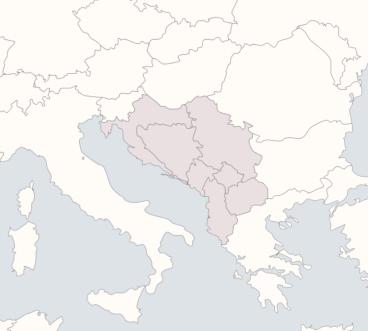WASHINGTON – Helsinki Commission Chairman Ben Cardin (MD) with Jeanne Shaheen (D-N.H.), Chair of the Senate Foreign Relations Subcommittee on Europe and Regional Security Cooperation and member of the Helsinki Commission, introduced new bipartisan legislation with Helsinki Commission Ranking Member Sen. Roger Wicker (MS) called the Western Balkans Democracy and Prosperity Act. This legislation would support economic development in the region through initiatives on infrastructure, trade and anti-corruption, including codification of sanctions to deter destabilizing activity In the Western Balkans.
Sens. Durbin (IL), Tillis (NC), Van Hollen (MD) and Murphy (CT) also are original cosponsors of the bipartisan legislation.
“While the Western Balkan nations have made great strides towards democratic governance since the end of the Yugoslav Wars, increasing political divisions and corruption threaten to erode this progress,” said Chairman Cardin. “We must continue to support our democratic partners and allies in the Balkans. This bipartisan bill will advance regional stability and anti-corruption efforts by establishing programs that encourage inclusive economic development, national anti-corruption strategy, and hold accountable those who threaten peace in the Western Balkans.”
“Amid Russia’s unprovoked war in Ukraine and Putin’s clear ambitions to spread malign influence across Eastern Europe, the United States’ relationship with the Western Balkans is pivotal. That’s why I’m proud to introduce new bipartisan legislation that strengthens trade and investments between the U.S. and Western Balkans, while rooting out local corruption and codifying sanctions against destabilizing actors – all of which pave the way for greater Euro-Atlantic integration,” said Sen.Shaheen. “When I traveled to the Western Balkans in the Spring, I met with young leaders who shared their dreams of building a prosperous future in countries with strong democratic institutions and economic opportunity. Their stories – their visions of building a brighter future for the next generation – inspired my legislation. This region deserves every tool possible to build sustainable democracies, and I’m proud to lead this bipartisan bill that would foster relations between the U.S. and our Balkan partners and encourage greater regional integration.”
“The Balkans are countries with a rich and varied heritage, and they also occupy an increasingly important position in European affairs,” said Sen. Wicker. “This bill would send a strong bipartisan signal that the United States is committed to supporting diplomacy in the region.”
“As Putin’s unprovoked war in Ukraine rages on, we must not forget the hard won peace in the Balkans, which suffered terrible violence after the breakup of Yugoslavia. The United States and our allies contributed greatly to ending that horrific conflict, and this legislation reaffirms our commitment to seeing a stable future for the region—one squarely rooted in the West,” said Sen. Durbin.
“The Balkans region is critical to Europe’s security, and we must deepen existing engagement with our partners as Russia continues its illegal war against Ukraine and threatens our NATO allies,” said Sen. Tillis. “In the spring, I was proud to visit Serbia, Bosnia-Herzegovina, Kosovo, and Belgium with Senator Shaheen to hear from leaders of these countries and relay to our colleagues the importance of expanding economic opportunity and combating corruption. This bipartisan legislation will demonstrate our support for their efforts to advance democracy, and I will work with my colleagues to build support and pass it out of Congress.”
“Despite Putin’s intent, his bloody war in Ukraine has not weakened our global alliances, but bolstered them. Increasing our partnerships with the Western Balkans will allow us to build on this and spur new economic cooperation between our nations. This legislation will help us capitalize on these opportunities as we continue to support strengthening democracy in the region,” said Sen. Van Hollen.
“Maintaining peace in the Balkans is critical to European security, especially as Putin grows more desperate in Ukraine and may turn to other countries for a victory. During my trip to the region this spring, it was clear the United States must deepen our engagement. This legislation will strengthen U.S.-Balkan ties, expand economic opportunity, and support efforts to advance democracy and root out corruption,” said Senator Murphy.
Specifically, the Western Balkans Democracy and Prosperity Act:
- Establishes a regional trade and economic competitiveness initiative, which would support democratic resilience, economic development and prosperity in the region.
- Establishes an anti-corruption initiative that directs the Secretary of State to provide technical assistance for each country in the Western Balkans to develop a national anti-corruption strategy.
- Codifies two U.S. executive orders that would grant authority for sanctions against those who threaten peace and stability in the Western Balkans and are engaged in corrupt behavior.
- Boosts university partnerships, encourages Peace Corps engagement in the region, creates a Balkans Youth Leadership Initiative and requires the Development Finance Corporation to open a previously announced office in the region.
Full text of the bill is available here.










